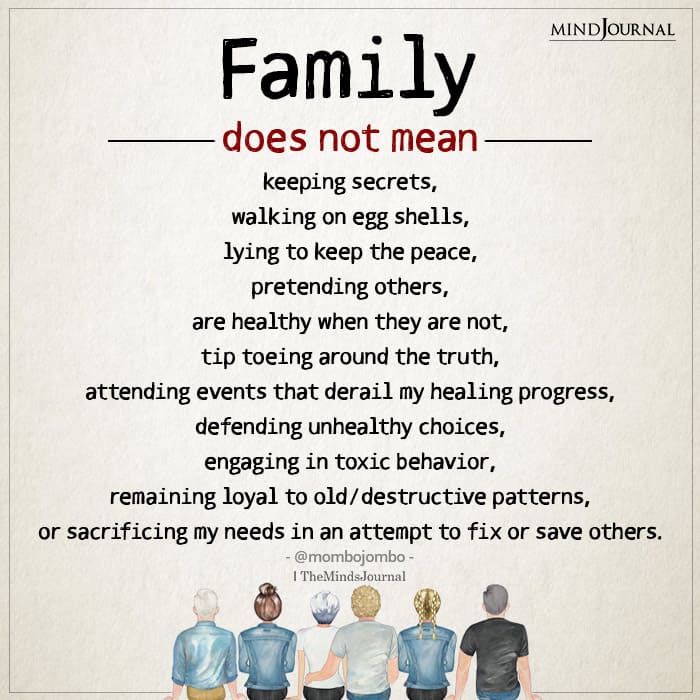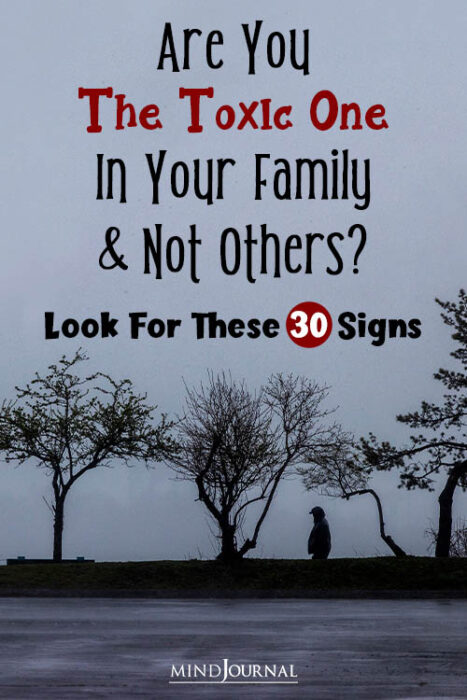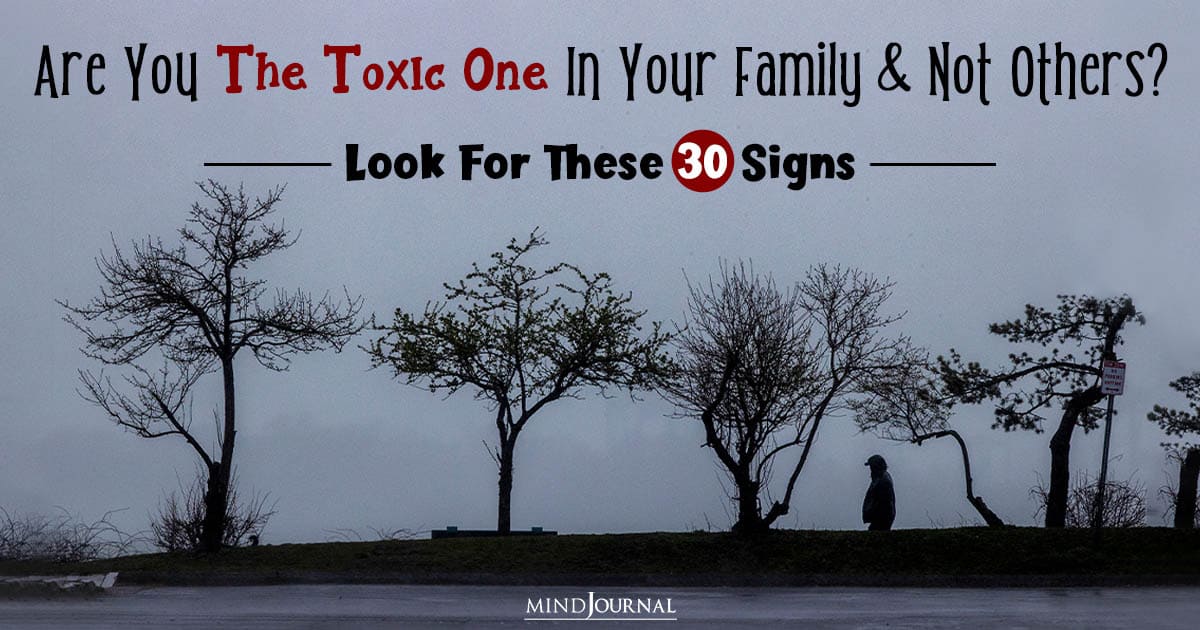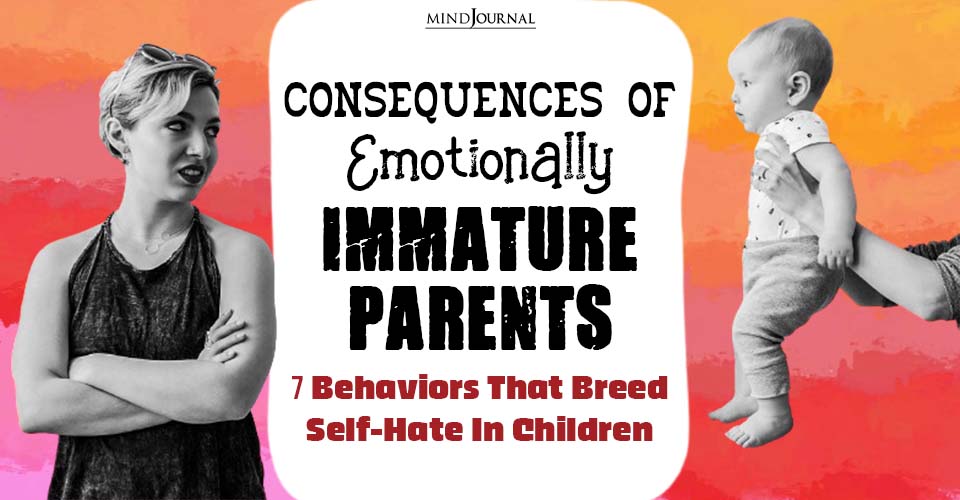In the quiet corners of your mind, does a nagging doubt take hold, whispering in your ears: “Am I the problem in my family?” It’s a perplexing conundrum that can haunt our thoughts and leave us yearning for clarity.
After all, family, with its tangled emotions and complex dynamics, can be both a source of immense love and joy, as well as a breeding ground for turmoil and strife. Join me as we delve and explore the delicate balance between self-reflection and familial dynamics.

Let’s seek to unravel the question that echoes within our hearts: “Why am I always the problem in my family”
Here are 30 signs you are the problem in your family!
Am I The Problem In My Family? 30 Shocking Cues To Look For
1. You have difficulty respecting authority figures
If you constantly struggle to obey the instructions or requests of your parents, siblings, or teachers, it could indicate a problem with authority. Resisting their guidance and insisting on doing things your way may create tension and conflict within your family.
2. You lack accountability
One of the signs you are the problem in your family is failing to take responsibility for your actions. This can be a significant issue if you repeatedly ignore or postpone tasks assigned to you, such as cleaning your room or completing chores, it shows a lack of responsibility.
This behavior can disrupt the harmony within your family and create frustration among your family members.
3. You’re chronically late for everything
One of the signs you are the problem in your family is consistently arriving late for appointments, family events, or commitments can cause inconvenience and annoyance for others.
If you struggle with time management and punctuality, it can disrupt the schedules and plans of your family members, leading to tensions and conflicts.
4. You’re constantly distracted by your phone
Being excessively engaged with your phone or other electronic devices while spending time with your family can create a sense of detachment and disinterest. It is important to be present and actively participate in conversations and activities.
Being overly focused on your phone can make others feel ignored and unimportant, potentially causing strain in your family relationships.
5. You habitually interrupt others
Interrupting others while they are speaking can be disruptive and disrespectful. Continuously disregarding the requests of your family members to stop interrupting demonstrates a lack of consideration for their thoughts and opinions.
This behavior can lead to arguments and create a sense of chaos within your family dynamics.
6. You have an excessive need for control
If you consistently try to manipulate and dictate how others should behave, it can strain relationships and create conflicts. Recognize the tendency to impose your plans and desires on others, as this can be a contributing factor to family issues.
7. You’re always criticizing
Do you wonder, “Am I the problem in my family?” Well, constantly focusing on the negative aspects of others and rarely acknowledging their positive qualities can be demoralizing and damaging to family dynamics.
Take a step back and reflect on whether your critical behavior is causing harm within your family relationships.
8. You engage in petty gossip
Sharing rumors and spreading stories behind people’s backs not only harms their reputation but also creates a toxic environment within your family. Understand the impact of gossiping on others and consider adopting a more positive and supportive approach.
9. You have a judgmental attitude
If you tend to pass judgment on others without truly getting to know them or solely based on their appearance, it can create an atmosphere of judgment within your family. Reflect on your own flaws and biases, and strive to be more open-minded and accepting.
10. You may emit negative vibes
If you consistently find that people tend to avoid you or make excuses to disengage from conversations with you, it may be a sign that your behavior or attitude is off-putting.
Consider how your words and actions may be perceived by others and strive to cultivate a more positive and welcoming demeanor.
11. You’re always out of the loop
If you usually find yourself as the last person to be informed about significant family news or events, it may be an indication that your behavior has caused others to hesitate in sharing with you.
Reflect on how you have responded to others’ achievements and milestones, and consider whether your reactions have been supportive and uplifting.
12. You don’t listen and lack respect
If you find it challenging to listen to and respect other people’s opinions, it can create tension within your family. Constantly criticizing them in a passive-aggressive manner can push them away. It’s crucial to rethink your approach to relationships and work on being more open and accepting of different viewpoints.
13. You refuse to apologize
Always feeling the need to be right and perfect can prevent you from taking responsibility for your actions.
This behavior not only damages your relationships but also harms your self-esteem. Remember, it’s not about who’s at fault, but how you treat others. It’s time to start apologizing when necessary and learn from your mistakes.
14. You’re constantly involved in drama
If you constantly find yourself surrounded by drama, it can be counterproductive for your personal growth and family relationships.
While some forms of drama may have positive aspects, excessive involvement can be detrimental. Try to evaluate situations objectively and focus on finding solutions rather than getting caught up in unnecessary conflicts.
15. You make others feel guilty for no reason
Trying to make others feel guilty for things they haven’t done wrong is damaging to your relationships. It creates unnecessary stress and tension. Instead, consider the consequences of your actions and strive to foster a supportive and understanding environment.
16. You lack empathy and understanding
If you’ve ever wondered, “What if I am the problem in my family?” Then one sign is your failure to empathize and understand other people’s perspectives can strain your relationships.
Communication plays a vital role in any healthy relationship, and listening to your family members’ viewpoints is crucial. If you notice that you’re not actively trying to understand others, it’s time to change your approach and make an effort to connect with them.
17. You can’t handle the truth
If you struggle to accept the truth within a relationship, it becomes challenging for both you and your partner. Avoiding the truth can create difficulties and hinder the success of any relationship.
It’s important to confront and accept the truth – that you are the problem in the family! Even if it means acknowledging your own mistakes or shortcomings.
Related: Do You Have A Toxic Support System? 8 Signs To Watch Out For
18. You consistently deflect blame onto others
If you think to yourself, “Am I the problem in my family? Then the answer to this is that when faced with problems or challenges, you habitually shift responsibility onto others rather than acknowledging your own role. This hinders personal growth and keeps you trapped in recurring patterns.
19. You frequently adopt a victim mentality
You tend to view yourself as a constant target, believing that the world is conspiring against you. This defensive mindset prevents you from building meaningful connections and restricts your personal development.
20. You exhibit excessive neediness
You rely heavily on others to fulfill your desires and constantly seek validation, leading to mental exhaustion. Your dependence on external opinions and advice prevents you from developing self-sufficiency and making independent decisions.
21. You struggle to celebrate others’ successes
Am I the problem, you ask? Well, instead of feeling genuine happiness for others, you feel envious or resentful of their achievements. This stems from your own inner dissatisfaction, and rather than supporting and applauding others, you seek to diminish their accomplishments.
22. You’re constantly finding faults
One of the signs you are the problem in your family is nitpicking everything. Instead of expressing gratitude or appreciation for someone’s efforts, you tend to nitpick and find fault.
For instance, if your spouse has spent the entire day cleaning, you may fixate on the fact that they forgot to unpack the dishwasher rather than acknowledging their hard work
This behavior devalues others and discourages them from helping you, as they can never seem to satisfy your expectations.
23. You exhibit boastful behavior
You have an inflated sense of superiority, considering yourself better and more deserving than others. This mindset leads to a distorted view of the world, where you believe others should be grateful for what you have, disregarding their own worth and experiences.
24. You struggle with humility or modesty
It is challenging for you to recognize and appreciate the positive qualities in others, as you tend to focus on their flaws. This aversion to differences creates barriers to accepting yourself and embracing diversity, hindering personal growth and acceptance.
25. You’re disrespectful
You often belittle and look down upon others, showing little regard for their feelings or needs. Your self-centeredness leads you to dismiss people who are different from you, as you dislike the idea of someone being better than you.
26. You’re always complaining about something or the other
You frequently complain about your life and its difficulties, yet you make little effort to improve yourself or take responsibility for your actions. Your tendency to blame others for everything that happens reflects a lack of proactive engagement with your own life.
27. You have an ungrateful attitude
You fail to appreciate what you have and the efforts of others. Your selfishness and sense of entitlement lead you to expect more than you deserve while disregarding the feelings and thoughts of those around you.
28. You’re dishonest
You frequently resort to lying, deceiving others, and damaging trust. You find it easier to tell falsehoods rather than face the truth, making it challenging for others to trust your words and actions.
29. You lack basic courtesy
You display rudeness towards others, disregarding their feelings and failing to show basic respect or courtesy. Your focus primarily revolves around your own needs and wants, leading to a lack of consideration for others.
30. You prioritize your own needs above all else
Lastly, one of the signs you are the problem in your family is that you often neglect the needs and well-being of others, solely focusing on your own happiness and comfort.
While it’s okay to think about yourself, constantly seeking validation and trying to prove yourself can overshadow the importance of empathy and compassion for those around you.
Related: What Is A Dysfunctional Family? Identifying Signs and Types Of Toxic Families
How to stop acting like this?
Recognizing that you are the problem in the family is the first step and if you want to change your behavior, here are some strategies to help you stop acting in ways that negatively impact your relationships:
1. Self-reflection :
Take the time to reflect on your thoughts, emotions, and actions. Consider the underlying reasons behind your behavior and identify any patterns or triggers that lead to negative attitudes or actions.
2. Seek feedback :
Ask trusted family members or friends for honest feedback about how your behavior affects them. Listen attentively to their perspectives without becoming defensive.
3. Practice empathy :
If you think that you are the problem in the family, then a conscious effort to put yourself in others’ shoes and try to understand their perspectives, feelings, and needs.
4. Practice gratitude :
Recognize and acknowledge the efforts and kindness shown to you. Focusing on gratitude can shift your mindset towards positivity.
5. Communication skills :
Practice open and honest communication, sharing your thoughts and feelings in a respectful manner.
6. Take responsibility :
Accept accountability for your actions and choices. Instead of blaming others, take ownership of your behavior and its consequences.
When questions like, “Am I the problem in my family” comes to your mind then, remember change takes time and effort. Be patient and kind to yourself as you work towards becoming a better version of yourself.
Frequently Asked Questions (FAQs)
Is my family toxic or am I the problem?
Determining whether your family is toxic or if you’re the problem requires introspection, open communication, and professional guidance to gain insight and perspective.
Why do I struggle to be around my family?
There could be various reasons why you struggle to be around your family, such as unresolved conflicts, differing values, or unhealthy dynamics.
Why am I always the problem in my family
It’s not necessarily true that you’re always the problem in your family. Family dynamics are complex and multifaceted. Self-reflection and open communication can help uncover underlying issues.









Leave a Reply
You must be logged in to post a comment.